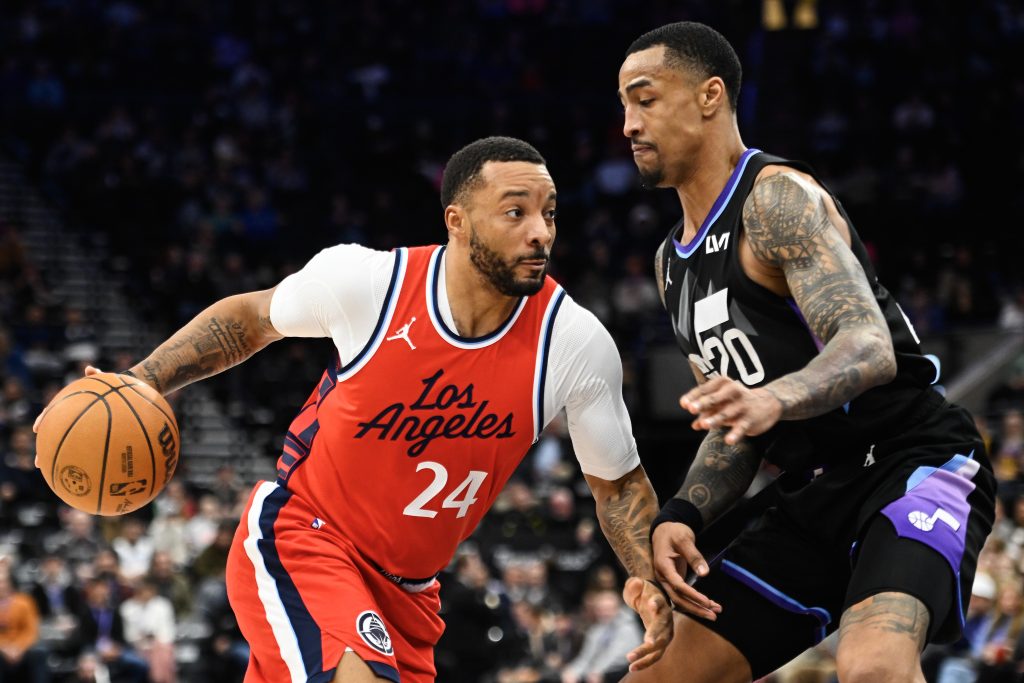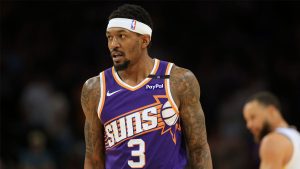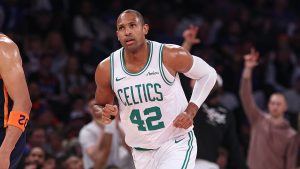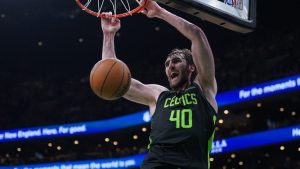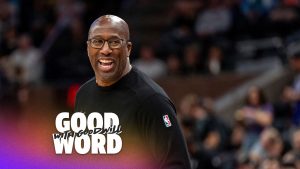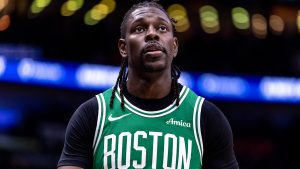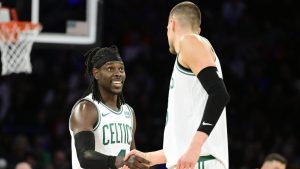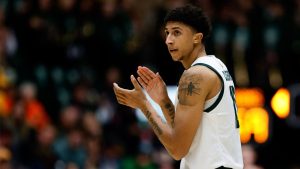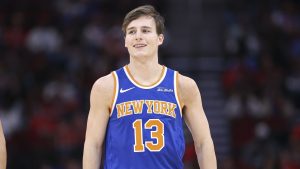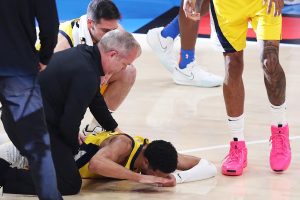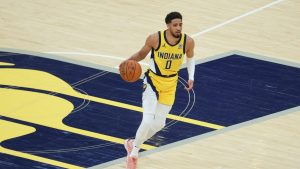It’s summer and time to chill for most, but three NBA teams had some business to tend to.
Yes, we have a trade, folks.
The Miami Heat, Utah Jazz, and Los Angeles Clippers are shuffling around pieces, so let’s get into which pieces and why they were shuffled.
The Heat, frustratingly, remains on in Miami
Heat give up: Kevin Love, Kyle Anderson
Heat get: Norman Powell
Sigh. All right, Pat Riley. You don’t want to rebuild, we get it. Heat culture! Winning! No tanking!
It’s all very, very adorable, but this Powell acquisition — which is a very strong return — runs the risk of Miami further indulging itself in what feels like an inevitable burnout.
The move itself, in a vacuum, is almost unrealistically good, but the needle hasn’t been moved enough in the direction of building championship equity.
Powell (21.8 points, 41.8 3FG%) is a shooting guard who, well, very much plays the role of a traditional shooting guard. He isn’t much of a playmaker (2.1 assists), is physically small (6-foot-3) and his play overlaps quite a bit with Tyler Herro.
This isn’t meant as criticism of Powell, who is frankly worth everyone’s time, but more so confusion at how Miami sees the fit. What’s the plan here, outside of maintaining “Heat Culture,” which is basically the same culture as everyone else?
At some point, it’d be nice to hear from the Heat how they envision themselves both this season and in the future.
This deal has to be graded in two segments. Sorry, there is no other way.
Return on value: A+
“What are we doing?” direction: C-
Clippers find their big man target
Clippers give up: Norman Powell, 2027 second-round pick
Clippers get: John Collins
With James Harden still on the team, finding legitimate lob threats is always of interest, even if Ivica Zubac and Derrick Jones Jr. are on the roster.
Collins is a bit more than just a lob-catcher, though. He averaged 19 points and 8.2 rebounds and posted damn-near 53/40/85 shooting splits this past season.
Collins has divided waters for years now. Some argue his impact is limited, others that his defense is the problem, and then there are some who don’t see him as much of a problem at all.
I’m in the latter camp, because one has to judge Collins for what he is, not for what he isn’t. For over half a decade, and before he even signed his second contract, it’s been known what type of player he is.
Collins is a scoring 4 who doesn’t have the positional fluidity to play center for defensive purposes. But what he does give you is quality rebounding and a legitimate inside-outside option to play off your main playmaker.
If you accept the parameters of what he is, there’s a frighteningly good player in there, even if that player comes with the recipe of having specific archetypes on the roster to optimize him.
Fortunately, the Clippers have that recipe. Collins could see his game grow, significantly, next to Harden.
I’d like to give this a big, juicy grade, but the loss of Powell isn’t insignificant. We have to bake that in.
Grade: B
(Now, if Bradley Beal ends up getting bought out of Phoenix and slides right into Powell’s old spot, then we can certainly revisit this grade.)
Financially motivated trades are no fun
Jazz give up: John Collins
Jazz get: Kyle Anderson, Kevin Love, 2027 Clippers second-round pick
Hello, darkness, my old friend …
I’m just going to say it. If you give up John Collins, and you take back a return that has the same value as unwashed trousers, then it’s always about the money.
And look, it makes sense. The Jazz also want to clear the roster a bit to make room for Ace Bailey to take a million shots. This does achieve that, in addition to shaving off roughly $13 million for this season.
Even so, it’s amazing we’ve gotten to this point where a player like Collins, who does produce at a high level, is efficient and does offer big-man elements such as screen-setting and rebounding, is simply left out in the dust when it comes to trade value.
You’d think — probably hope — a player of his caliber could return a better haul, but apparently that’s become a ridiculous notion based off reasons that seem half-baked.
As such, it means Utah spent two years trying to build up Collins’ value, only to take back — gestures disappointingly — this. Ugh.
It’s not Utah’s fault the market seems to have overcorrected on productive in-prime but not quite All-Star-level players, but unfortunately we have to judge the Jazz off the return, which isn’t pretty.
Grade: C-
(Though, if the ripple effects of this deal lead to superstardom for Bailey, a new assessment will gladly be booked by yours truly.)
It’s summer and time to chill for most, but three NBA teams had some business to tend to.
Yes, we have a trade, folks.
The Miami Heat, Utah Jazz, and Los Angeles Clippers are shuffling around pieces, so let’s get into which pieces and why they were shuffled.
Heat give up: Kevin Love, Kyle Anderson
Heat get: Norman Powell
Advertisement
Advertisement
Advertisement
Sigh. All right, Pat Riley. You don’t want to rebuild, we get it. Heat culture! Winning! No tanking!
It’s all very, very adorable, but this Powell acquisition — which is a very strong return — runs the risk of Miami further indulging itself in what feels like an inevitable burnout.
The move itself, in a vacuum, is almost unrealistically good, but the needle hasn’t been moved enough in the direction of building championship equity.
Powell (21.8 points, 41.8 3FG%) is a shooting guard who, well, very much plays the role of a traditional shooting guard. He isn’t much of a playmaker (2.1 assists), is physically small (6-foot-3) and his play overlaps quite a bit with Tyler Herro.
Advertisement
Advertisement
Advertisement
This isn’t meant as criticism of Powell, who is frankly worth everyone’s time, but more so confusion at how Miami sees the fit. What’s the plan here, outside of maintaining “Heat Culture,” which is basically the same culture as everyone else?
At some point, it’d be nice to hear from the Heat how they envision themselves both this season and in the future.
This deal has to be graded in two segments. Sorry, there is no other way.
Return on value: A+
“What are we doing?” direction: C-
Clippers give up: Norman Powell, 2027 second-round pick
Clippers get: John Collins
Advertisement
Advertisement
Advertisement
With James Harden still on the team, finding legitimate lob threats is always of interest, even if Ivica Zubac and Derrick Jones Jr. are on the roster.
Collins is a bit more than just a lob-catcher, though. He averaged 19 points and 8.2 rebounds and posted damn-near 53/40/85 shooting splits this past season.
Collins has divided waters for years now. Some argue his impact is limited, others that his defense is the problem, and then there are some who don’t see him as much of a problem at all.
I’m in the latter camp, because one has to judge Collins for what he is, not for what he isn’t. For over half a decade, and before he even signed his second contract, it’s been known what type of player he is.
Collins is a scoring 4 who doesn’t have the positional fluidity to play center for defensive purposes. But what he does give you is quality rebounding and a legitimate inside-outside option to play off your main playmaker.
Advertisement
Advertisement
Advertisement
If you accept the parameters of what he is, there’s a frighteningly good player in there, even if that player comes with the recipe of having specific archetypes on the roster to optimize him.
Fortunately, the Clippers have that recipe. Collins could see his game grow, significantly, next to Harden.
I’d like to give this a big, juicy grade, but the loss of Powell isn’t insignificant. We have to bake that in.
Grade: B
(Now, if Bradley Beal ends up getting bought out of Phoenix and slides right into Powell’s old spot, then we can certainly revisit this grade.)
Jazz give up: John Collins
Jazz get: Kyle Anderson, Kevin Love, 2027 Clippers second-round pick
Advertisement
Advertisement
Advertisement
Hello, darkness, my old friend …
I’m just going to say it. If you give up John Collins, and you take back a return that has the same value as unwashed trousers, then it’s always about the money.
And look, it makes sense. The Jazz also want to clear the roster a bit to make room for Ace Bailey to take a million shots. This does achieve that, in addition to shaving off roughly $13 million for this season.
Even so, it’s amazing we’ve gotten to this point where a player like Collins, who does produce at a high level, is efficient and does offer big-man elements such as screen-setting and rebounding, is simply left out in the dust when it comes to trade value.
Advertisement
Advertisement
Advertisement
You’d think — probably hope — a player of his caliber could return a better haul, but apparently that’s become a ridiculous notion based off reasons that seem half-baked.
As such, it means Utah spent two years trying to build up Collins’ value, only to take back — gestures disappointingly — this. Ugh.
It’s not Utah’s fault the market seems to have overcorrected on productive in-prime but not quite All-Star-level players, but unfortunately we have to judge the Jazz off the return, which isn’t pretty.
Grade: C-
(Though, if the ripple effects of this deal lead to superstardom for Bailey, a new assessment will gladly be booked by yours truly.)

